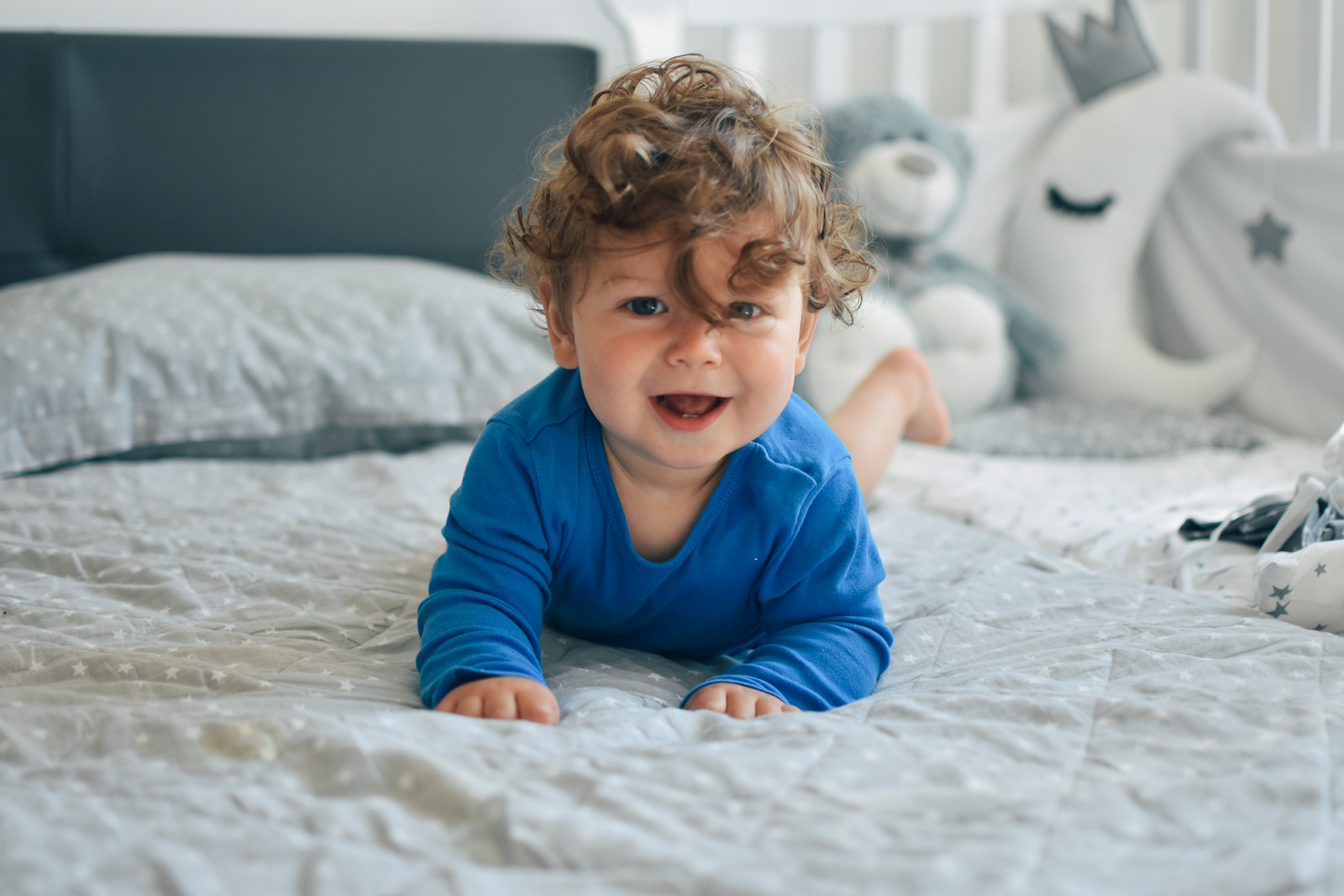One of the most important factors in the overall baby health and well-being of a newborn baby is sleep. However, many new parents struggle to understand the sleep patterns of their babies and how to establish healthy sleep habits. In this guide, we will discuss the typical sleep patterns of babies, sleep tips for babies, as well as the various toddler sleep training methods available to parents. Read on to learn more about how to get a baby to sleep through the night.
Understanding Baby Sleep Patterns
Here are some of our newborn sleep tips. The sleep patterns of a newborn baby are vastly different from those of an adult. Newborns require up to 18 hours of sleep per day, with sleep occurring in short intervals of 2-4 hours at a time. As babies grow, their sleep patterns change, and they begin to sleep for longer periods at night.
By the time a baby is three months old, they will typically sleep for around 15 hours per day, with longer stretches of 4-6 hours of sleep at night. By six months old, most babies can sleep through the night, although some may still require one feeding during the night.
Parents need to understand that every baby is different, and there is no one-size-fits-all sleep pattern. Some babies may require more sleep than others, while some may be more difficult to get to sleep or to stay asleep. Read on to know more about sleep tips for babies.
Establishing a Baby Sleep Routine Healthy Habits
How to get a baby to sleep through the night? Establishing healthy sleep habits in babies is important for their overall baby health and well-being. One of the best ways to do this is to establish a consistent sleep routine. This routine should include a bedtime routine that is calming, such as a bath, a story, or a lullaby.
It is also important to create a sleep environment that is conducive to sleep. This includes a dark, quiet room with a comfortable temperature. Many parents find that a white noise machine or a fan can also help to create a soothing sleep environment.
Another important factor in establishing healthy sleep habits is to avoid overstimulation before bedtime. This means limiting screen time and stimulating activities before bedtime, as well as keeping the environment calm and relaxing. We hope these newborn sleep tips will be convenient for you.
Baby sleep training methods
Sleep training is the process of teaching a baby to comfortably fall asleep on time. Moreover, stay asleep on their own. There are several toddler sleep training methods available, and parents need to choose a method that works for them and their babies. Here are some baby sleep training methods.
Graduated extinction method
The Ferber approach, commonly called “graduated extinction,” is one of the most well-liked sleep training techniques. This method involves gradually increasing the amount of time that a baby is left to cry before being comforted by a parent. Parents must be consistent and adhere to the plan for this strategy to work.
No tears method
Another sleep training method is the “no tears” method, which involves responding immediately to a baby’s cries and providing comfort and reassurance as needed. This can work, but it needs a lot of persistence and patience.
Pick-up, put-down method
The “pick-up, put-down” method is another popular sleep training method. This method involves picking up a baby when they cry and putting them back down once they are calm, repeating the process until the baby falls asleep.
These baby sleep training methods are effective but make sure to choose the most convenient one for you and your baby.
When to Seek Help
While it is normal for babies to have sleep disruptions from time to time, parents need to seek help if they are concerned about their baby’s sleep patterns. Signs that a baby may be experiencing sleep disturbances include frequent waking, difficulty falling asleep, and excessive daytime sleepiness.
Remember to consult a baby sleep consultant or a sleep specialist for more help. These professionals can provide guidance and support in addressing any sleep issues and developing a plan for healthy sleep habits.
It is also important to seek help if sleep training methods are not working. While some babies may respond well to a particular method, others may not. If a toddler sleep training method is not effective or if it is causing excessive stress for the baby or parents, it may be time to consider a different approach.
Wrapping Up
In conclusion, understanding how to get a baby to sleep through the night and establishing healthy sleep habits is crucial for the overall baby health and well-being of a newborn. While every baby is different and there is no one-size-fits-all approach, parents can take steps to create a consistent sleep routine and environment, as well as choose a sleep training method that works for their baby and family.
It is important to be patient and consistent with sleep training and to seek help if necessary. With time and effort, most babies can develop healthy sleep habits and get the rest they need for optimal growth and baby development. I hope these sleep tips for babies work for you and check out our blog posts for more information about newborn care.
FAQs and newborn sleep tips
When should I start sleep training my baby?
Sleep training can be started as early as 4-6 months old, but every baby is different. It’s important to consult with a baby sleep consultant to determine if your baby is ready for sleep training.
Can I sleep train my baby if they are breastfed?
Yes, breastfed babies can be sleep trained just like bottle-fed babies. However, it’s important to make sure they are getting enough feeding during the day and night.
How long should I let my baby cry during sleep training?
This varies depending on the sleep training method you choose. Some methods involve gradually increasing the amount of time your baby is left to cry, while others involve responding immediately to your baby’s cries. It’s important to choose a method that works for you and your baby and to be consistent with it.
Will sleep training harm my baby?
No, sleep training does not harm babies. However, it’s important to choose a method that is appropriate for your baby’s age and temperament and to be consistent with it.
How can I determine how much sleep my infant is getting?
Signs that your baby is getting enough sleep include being alert and content during the day, having regular naps and nighttime sleep, and waking up easily and happily.
Should I awaken my infant to feed them in the middle of the night?
This depends on your baby’s age and weight. Newborns and younger babies may need to be fed every few hours during the night, while older babies may be able to sleep through the night without feedings. It’s important to consult with a baby sleep consultant to determine if your baby is ready to sleep through the night without feedings.
How can I make my baby’s bedroom a peaceful place to sleep?
A good sleep environment for babies should be quiet, dark, and cool. Use a sound machine or white noise to block out any noises that could wake your baby up. Also, use blackout curtains or shades to make the room as dark as possible. Finally, make sure the room temperature is between 68-72 degrees Fahrenheit to keep your baby comfortable.
What if my baby wakes up frequently during the night?
Frequent waking during the night is normal for babies, especially newborns. However, if your baby is waking up excessively or is having trouble falling back to sleep on their own, it may be time to consider sleep training.
Must I allow my infant to snooze throughout the day?
Yes, babies need regular naps throughout the day to get the sleep they need for optimal growth and baby development. It’s important to establish a consistent nap schedule and routine for your baby.
What if my baby is still not sleeping well after sleep training?
If sleep training is not effective or is causing excessive stress for your baby or family, it may be time to consider a different approach or seek help from a pediatrician or sleep specialist.
What should I do if my baby is sick or teething during sleep training?
If your baby is sick or teething, it may be best to postpone sleep training until they are feeling better. Focus on providing comfort and newborn care for your baby during this time. Once they are feeling better, you can resume sleep training as appropriate.
Pro Tip
Remember, every baby is different. It’s important to be patient, and consistent, and seek guidance when needed to help your baby develop healthy sleep habits and get the rest they need for optimal growth and baby development.

